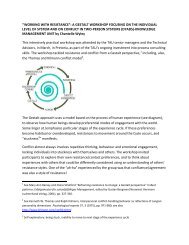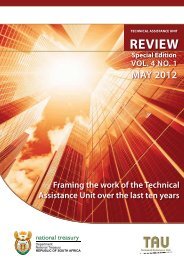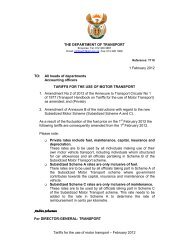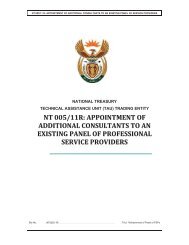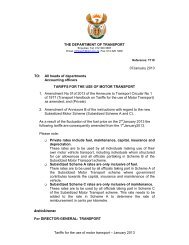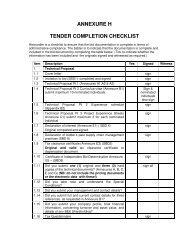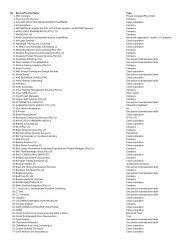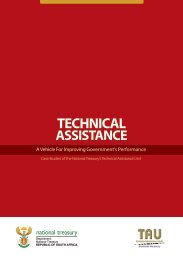Review 3 final 2 - TAU - National Treasury
Review 3 final 2 - TAU - National Treasury
Review 3 final 2 - TAU - National Treasury
Create successful ePaper yourself
Turn your PDF publications into a flip-book with our unique Google optimized e-Paper software.
TECHNICAL ASSISTANCE UNIT REVIEW | Gender mainstreaming in governance<br />
South Africa has managed to tackle some of these with<br />
a significant set of results for efforts made, however<br />
there are still areas that require more resources and<br />
actions.<br />
Issues of social exclusion and power in society are<br />
critical to consider when evaluating whether or not this<br />
new way of governing has had any significant benefit<br />
to women’s needs. The South African network society,<br />
as other network societies, has a means of including<br />
certain groups and excluding others; by virtue of their<br />
means to ‘rightly associate’ or pull together human and<br />
financial resources that are sufficient for them to gain<br />
power to deliberate. It is therefore vital to analyse the<br />
women’s agenda, not by how many institutions alone<br />
have been able to enforce their thinking into the public<br />
policy arena, but as well as whether all women, and in<br />
particular those poverty stricken and in rural areas, are<br />
able to access powerful networks as well.<br />
Lastly considerations from the African Peer <strong>Review</strong><br />
Mechanisms, and in particular the June 2006 CSAR 3 , are<br />
also critical to point out, and in particular those related<br />
to ‘Democracy and good political governance.’ The<br />
3 Country Self-Assessment Report<br />
assessment found the following as concerning areas<br />
that need further interventions (African Peer <strong>Review</strong><br />
Mechanism 2010: 341).<br />
• Competition for limited resources between citizens<br />
and non-national seeking political and economic<br />
stability in South Africa is a potential source of<br />
conflict.<br />
• Violence against, and in particular the trafficking of,<br />
women and children is a source of concern.<br />
• The ability of the public sector to deliver services is<br />
constrained by a lack of both skills and capacity.<br />
• Many people, particularly those living in rural<br />
communities and children from other countries<br />
(for example refugees), have poor access to justice,<br />
education and health care.<br />
• Parliament lacks the capacity to exercise its oversight<br />
role, particularly in considering proposed legislation<br />
concerning finance.<br />
• Corruption affects public access to services, and<br />
the protection provided to whistle-blowers is<br />
inadequate.<br />
• The number of children in detention is increasing.<br />
• There is active discrimination against vulnerable<br />
groups including non-nationals. The latter raises<br />
concerns about xenophobia.<br />
page 27<br />
Enabling change for development



